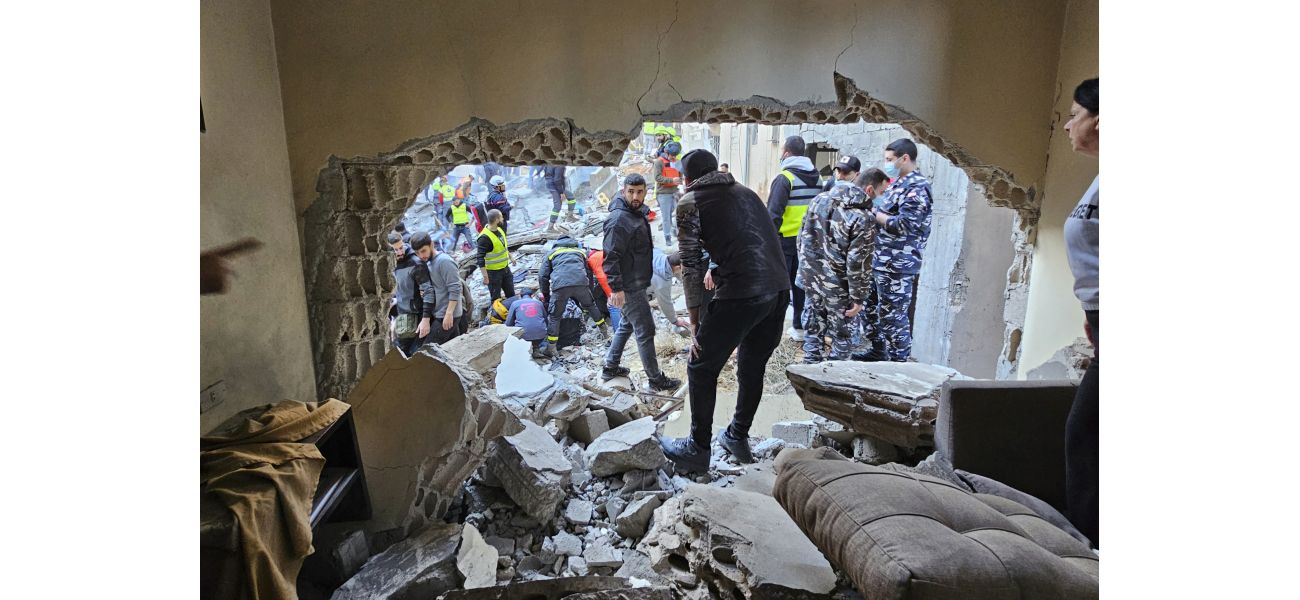Israel bombs Beirut in advance of truce decision.
Israeli planes hit Beirut before vote on US ceasefire to end year-long conflict with Hezbollah.
November 26th 2024.

On Tuesday, Israeli warplanes carried out airstrikes in central Beirut and the southern suburbs of the city. The bombings resulted in thick smoke covering the Lebanese capital, just as Israel's leadership was preparing to vote on a US-brokered ceasefire aimed at ending the ongoing conflict with Hezbollah.
In addition to these airstrikes, the Israeli military also issued warnings for 20 more buildings in Beirut's suburbs to evacuate before they too were targeted. This was seen as a clear indication that Israel was determined to continue punishing Hezbollah until the very last moment before any ceasefire could take effect. Furthermore, Israeli ground troops reached parts of Lebanon's Litani River for the first time in the conflict, a significant development in the emerging ceasefire.
While a ceasefire was not yet guaranteed, it was expected that Israel's security Cabinet, which was meeting on Tuesday afternoon, would approve the US-backed proposal. Lebanese officials had also expressed their support for the deal, indicating that Hezbollah was also on board with the ceasefire. If all parties agreed, it would be a major step towards ending the devastating war that has not only affected Israel and Lebanon, but also caused tensions to rise in the entire region.
The proposed ceasefire would involve a two-month halt in fighting and require Hezbollah to withdraw its armed presence from a large area in southern Lebanon. In return, Israeli troops would return to their side of the border. Additionally, thousands of Lebanese troops and UN peacekeepers would be deployed in the south, while an international panel led by the United States would monitor all sides' compliance.
However, the implementation of this ceasefire remained uncertain. While Israel demanded the right to take action if Hezbollah violated the terms of the agreement, Lebanese officials rejected this condition. In fact, Israel's Defense Minister, Israel Katz, warned that the military would strike Hezbollah if the UN peacekeeping force, known as UNIFIL, failed to effectively enforce the deal. He made this statement while speaking to UN Special Envoy Jeanine Hennis-Plasschaert.
Meanwhile, the European Union's top diplomat, Josep Borrell, assured that Israel's security concerns had been addressed in the US-French-brokered deal. He stressed the importance of implementing a ceasefire to prevent Lebanon from falling apart and stated that the US would chair a ceasefire implementation committee, with the participation of France at Lebanon's request.
Despite growing optimism among Israeli, US, Lebanese, and international officials, Israel continued its campaign in Lebanon, with the aim of crippling Hezbollah's military capabilities. On Tuesday, an Israeli strike destroyed a residential building in the central Beirut district of Basta, the second time in recent days that it had hit the densely populated area near the city's downtown. While there were no immediate reports of casualties, it was clear that the target of the strike was a Hezbollah official or asset.
In addition to this, Israeli jets also targeted at least six buildings in Beirut's southern suburbs, including one near the country's only airport. Despite this, the airport continued to function, as it was located on the Mediterranean coast, next to the heavily populated suburbs where Hezbollah is based. The Israeli military also issued evacuation warnings for 20 buildings in the suburbs and a warning for the southern town of Naqoura, where UNIFIL is headquartered. Furthermore, strikes also hit the southern city of Tyre, resulting in the death of a local Hezbollah commander, according to the Israeli military.
Meanwhile, Israeli ground troops clashed with Hezbollah forces and destroyed rocket launchers in the Slouqi area on the eastern end of the Litani River, just a few kilometers from the border. This was a significant development, as the ceasefire deal required Hezbollah to move its forces north of the Litani, which is about 30 kilometers from the Israeli border in some places.
A ceasefire between Israel and Hezbollah, the strongest Iranian-backed force in the region, would greatly reduce tensions in the region and prevent a full-scale war between Israel and Iran. However, it was unclear how this ceasefire would affect the ongoing Israel-Hamas war in Gaza. While Hezbollah had previously insisted on a ceasefire only after the Gaza war ended, this condition was dropped. The conflict between Israel and Hezbollah had started when Hezbollah began firing into northern Israel in support of the Palestinians, a day after Hamas launched an attack on southern Israel in October 2023, triggering the Gaza war. In response, Israel retaliated against Hezbollah, and the two sides have been exchanging attacks since then.
The ceasefire deal was seen as a potential solution to end this conflict, but previous hopes for a ceasefire had been dashed. US officials warned that negotiations were not yet complete and that there could be last-minute obstacles that could delay or even prevent an agreement. As White House national security spokesman John Kirby stated, "Nothing is done until everything is done."
While the ceasefire proposal was expected to be approved by Netanyahu's security Cabinet, one hard-line member, National Security Minister Itamar Ben-Gvir, expressed his opposition to the deal. He believed that agreeing to a ceasefire with Lebanon would be a "big mistake" and a "missed historic opportunity to eradicate Hezbollah." As the situation continued to unfold, it remained to be seen if a ceasefire would finally be achieved and bring an end to the devastating conflict.
In addition to these airstrikes, the Israeli military also issued warnings for 20 more buildings in Beirut's suburbs to evacuate before they too were targeted. This was seen as a clear indication that Israel was determined to continue punishing Hezbollah until the very last moment before any ceasefire could take effect. Furthermore, Israeli ground troops reached parts of Lebanon's Litani River for the first time in the conflict, a significant development in the emerging ceasefire.
While a ceasefire was not yet guaranteed, it was expected that Israel's security Cabinet, which was meeting on Tuesday afternoon, would approve the US-backed proposal. Lebanese officials had also expressed their support for the deal, indicating that Hezbollah was also on board with the ceasefire. If all parties agreed, it would be a major step towards ending the devastating war that has not only affected Israel and Lebanon, but also caused tensions to rise in the entire region.
The proposed ceasefire would involve a two-month halt in fighting and require Hezbollah to withdraw its armed presence from a large area in southern Lebanon. In return, Israeli troops would return to their side of the border. Additionally, thousands of Lebanese troops and UN peacekeepers would be deployed in the south, while an international panel led by the United States would monitor all sides' compliance.
However, the implementation of this ceasefire remained uncertain. While Israel demanded the right to take action if Hezbollah violated the terms of the agreement, Lebanese officials rejected this condition. In fact, Israel's Defense Minister, Israel Katz, warned that the military would strike Hezbollah if the UN peacekeeping force, known as UNIFIL, failed to effectively enforce the deal. He made this statement while speaking to UN Special Envoy Jeanine Hennis-Plasschaert.
Meanwhile, the European Union's top diplomat, Josep Borrell, assured that Israel's security concerns had been addressed in the US-French-brokered deal. He stressed the importance of implementing a ceasefire to prevent Lebanon from falling apart and stated that the US would chair a ceasefire implementation committee, with the participation of France at Lebanon's request.
Despite growing optimism among Israeli, US, Lebanese, and international officials, Israel continued its campaign in Lebanon, with the aim of crippling Hezbollah's military capabilities. On Tuesday, an Israeli strike destroyed a residential building in the central Beirut district of Basta, the second time in recent days that it had hit the densely populated area near the city's downtown. While there were no immediate reports of casualties, it was clear that the target of the strike was a Hezbollah official or asset.
In addition to this, Israeli jets also targeted at least six buildings in Beirut's southern suburbs, including one near the country's only airport. Despite this, the airport continued to function, as it was located on the Mediterranean coast, next to the heavily populated suburbs where Hezbollah is based. The Israeli military also issued evacuation warnings for 20 buildings in the suburbs and a warning for the southern town of Naqoura, where UNIFIL is headquartered. Furthermore, strikes also hit the southern city of Tyre, resulting in the death of a local Hezbollah commander, according to the Israeli military.
Meanwhile, Israeli ground troops clashed with Hezbollah forces and destroyed rocket launchers in the Slouqi area on the eastern end of the Litani River, just a few kilometers from the border. This was a significant development, as the ceasefire deal required Hezbollah to move its forces north of the Litani, which is about 30 kilometers from the Israeli border in some places.
A ceasefire between Israel and Hezbollah, the strongest Iranian-backed force in the region, would greatly reduce tensions in the region and prevent a full-scale war between Israel and Iran. However, it was unclear how this ceasefire would affect the ongoing Israel-Hamas war in Gaza. While Hezbollah had previously insisted on a ceasefire only after the Gaza war ended, this condition was dropped. The conflict between Israel and Hezbollah had started when Hezbollah began firing into northern Israel in support of the Palestinians, a day after Hamas launched an attack on southern Israel in October 2023, triggering the Gaza war. In response, Israel retaliated against Hezbollah, and the two sides have been exchanging attacks since then.
The ceasefire deal was seen as a potential solution to end this conflict, but previous hopes for a ceasefire had been dashed. US officials warned that negotiations were not yet complete and that there could be last-minute obstacles that could delay or even prevent an agreement. As White House national security spokesman John Kirby stated, "Nothing is done until everything is done."
While the ceasefire proposal was expected to be approved by Netanyahu's security Cabinet, one hard-line member, National Security Minister Itamar Ben-Gvir, expressed his opposition to the deal. He believed that agreeing to a ceasefire with Lebanon would be a "big mistake" and a "missed historic opportunity to eradicate Hezbollah." As the situation continued to unfold, it remained to be seen if a ceasefire would finally be achieved and bring an end to the devastating conflict.
[This article has been trending online recently and has been generated with AI. Your feed is customized.]
[Generative AI is experimental.]
0
0
Submit Comment





